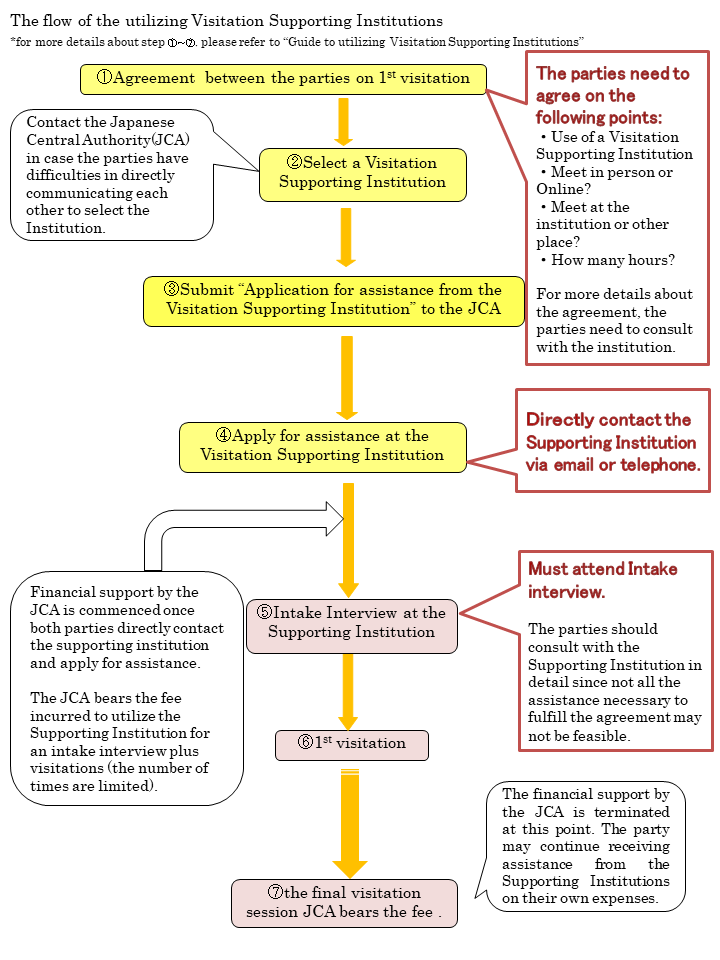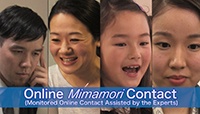The Hague Convention (Convention on the Civil Aspects of International Child Abduction)
To Those Who Want to Have Visitation with the child (Assistance Provided by the Central Authority of Japan based on the Hague Convention)
1. Introduction about the Visitation Support Institutions
The Hague Convention prescribes that the Contracting States should support for providing opportunities for parent-child visitation or contact based on the idea that improving difficult circumstances of having parent-child contact across the border and ensuring opportunities for those contact would lead to the interest of children.
The Ministry of Foreign Affairs of Japan, which assumes the role of the Central Authority of Japan (JCA) under the Hague Convention, can introduce both the relevant parties to visitation support institutions and provide financial support to utilize such institution within certain limitation, if they reach an agreement on the matter of visitation.
In order to receive support from the JCA, it is necessary that the JCA has decided on assistance after you have filed an application to the JCA under the Hague Convention Implementation Act.
2. General View of Our Support in Child Visitation
General view of our support in child visitation provided by the JCA is shown as follows: (the procedures, however, are different depending on each visitation support institution, so please contact directly to each visitation support institution for more details.)

3. Details of Our Support in Child Visitation
- (1) A visitation support institution reviews the contents of the agreement reached by both parties and explains the rules and conditions for providing assistance through separate intake interviews for each party. Following the intake interviews, the institution decides whether it can grant assistance or not. (Please note that visitation assisted by the supporting scheme of the JCA can be arranged at maximum for four in-person sessions and four indirect sessions, such as “Online Mimamori Contact (please refer to (3) below for more details)”for each case. From Oct.1, 2020, in-person sessions can be replaced with online Mimamori sessions if in-person sessions are not used up to 4 sessions. If the party wishes to replace all in-person sessions with online Mimamori sessions, a total of 8 online Mimamori sessions can be used.)
- (2) On the day of the arranged visitation, the visitation support institution will take the child to the other party and accompany the child to the site of visitation. During the visitation, the visitation support institution will assess compliance with the arranged conditions, and the relevant party will be warned if they are found to be non-compliant. If it is difficult for the parties to communicate with each other, the visitation support institution will, on their behalf, communicate with both parties to set the date, time, and place for the visitation.
- (3) Furthermore, an institution may also provide Online Mimamori Contact: monitored online contact assisted by the experts, which provides an online virtual conference room for all participants to join via internet. Those eligible to use this service will be able to have online meeting sessions with assistance from an expert. Users are required to prepare their own online network and devices, such as PC, tablet, or smartphone. The cost of this service will be covered by the Ministry of Foreign Affairs of Japan for a limited number of sessions. The expert may be involved in the sessions by attending to the child's psychological condition through careful observation of the child's facial and verbal expressions, as well as behaviors. For example, the expert may warn, mute, or disconnect a particular person from the meeting if they make inappropriate expressions or comments. For more details, please refer to the attached video clip.

- (4) When you receive the support from the JCA, you are advised to take note of the following points:
- Filming and recording are not allowed during the visitation.
- The JCA and visitation support institutions will not make a report on visitation for the parties.
- You have to be aware that the JCA will not pay any incurred expenses such as admission fees to the venue where access to child takes place.
- In cases where a visitation session is suspended due to reasons attributed to the visitation support institution, and the party wishes to use another visitation support institution, the JCA will once again provide support to facilitate communication between both parties in order to arrange with the selected visitation support institution.
4. How to Use Assistance in Child Visitation of the Central Authority of Japan
- (1) Contact the JCA via email or phone once both parties agree and decide which visitation support institution to use from the List of the Visitation Support Institutions (PDF)
 . In case the parties have difficulties in communicating each other to select the institution, please contact the JCA as we may be able to help communication between both parties.
. In case the parties have difficulties in communicating each other to select the institution, please contact the JCA as we may be able to help communication between both parties. - (2) Submit an attached form (PDF)
 to the JCA.
to the JCA. - [note] Each party needs to submit the form to the JCA. After receiving the forms from each party, the JCA makes initial contact with the visitation support institution selected by both parties
- (3) Contact the visitation support institution via email or telephone to apply for assistance.
- [note] Each of the parties needs to directly contact the visitation support institution and apply for assistance. Each party should schedule the intake interview with the visitation support institution. In case the parties and the visitation support institution do not reach an agreement on the contents of assistance through the intake interviews, and, as a result, the parties are not able to receive assistance from the selected institution, the JCA could refer to another visitation support institution.


